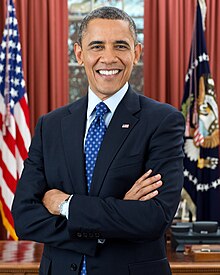Barack Obama -
President of the United States from 2009 - ?
Here it comes, folks, I predicted it a few years ago ... and, I wonder if this is the start of something .... that will allow HIM ...... more time in office????????? Remember, there was NO WAY he could beat Hillary, there was no way he could win the election, there was no way he could get his ObamaCare passed, and no way he could win a second term ..... I have stated for years, he may be in that office .................... forever ..... SO, don't tell me it could never happen ... I think the "wheels" are slowly turning ..... he has little to nothing to say about his predecessor, maybe he already knows that there may never be one .............. he just sits back, puts his feet upon that gorgeous antique desk, and smiles ....... then ..... "Hey, get my plane ready, I think I'll go golfin."
The 22nd Amendment also bars a President from serving more than 10 years in office, in a case of a President who assumed office as Vice President.
For example, Vice President Gerald Ford took over for President Richard Nixon in 1974 and served more than two years as president. If Ford had defeated Jimmy Carter in the 1976 presidential election, Ford could not have run for re-election.
Long before the 22nd Amendment, George Washington had set an unofficial precedent in 1796 when he decided several months before the election not to seek a third term. But Alexander Hamilton and many Founders wanted a strong executive, and they opposed term limits as a concept. Thomas Jefferson and an equally influential group of Founders supported term limits for the President.
The only person to break from Washington’s precedent was President Franklin D. Roosevelt, with a record-setting four election wins. Before Roosevelt ran for re-election in 1940, most Presidents didn’t try for a third term in office, let alone a third consecutive term.
Roosevelt’s distant cousin, Theodore, came the closest to breaking the precedent in 1912, when he ran for President a second time. Theodore Roosevelt succeeded President William McKinley in 1901 and had served about 7 ½ years in the White House. Theodore Roosevelt passed on running for a third consecutive term in 1908, fully aware of the Washington precedent. But after a fallout with President William Howard Taft, Roosevelt sought a third nonconsecutive term in the 1912 presidential election. He lost the election but came in second ahead of Taft. (Woodrow Wilson and Harry Truman briefly considered seeking a third term but passed.)
After Franklin Roosevelt died in 1945, momentum built for a presidential term-limits amendment. Congress passed it in 1947, and it was ratified by the states in 1951.
Since then, several members of Congress have introduced bills to repeal the 22nd Amendment. The latest was offered by Representative Jose Serrano on January 4, 2013.
In fact, Serrano has offered the same bill since 1997–during the presidencies of Bill Clinton, George W. Bush and Barack Obama. The bills were tabled each time.
Representative Steny Hoyer offered similar bills in the past and current Senate Majority Leader Mitch McConnell sponsored a similar bill in 1995—during the Clinton administration. Barney Frank and Jerry Nadler also presented anti-22nd Amendment bills in the past.
There was no interest among legislators in pursuing a 22nd Amendment repeal, probably because most people are happy with term limits for the President. The odds of getting 38 states to ratify an amendment would be very, very steep.

